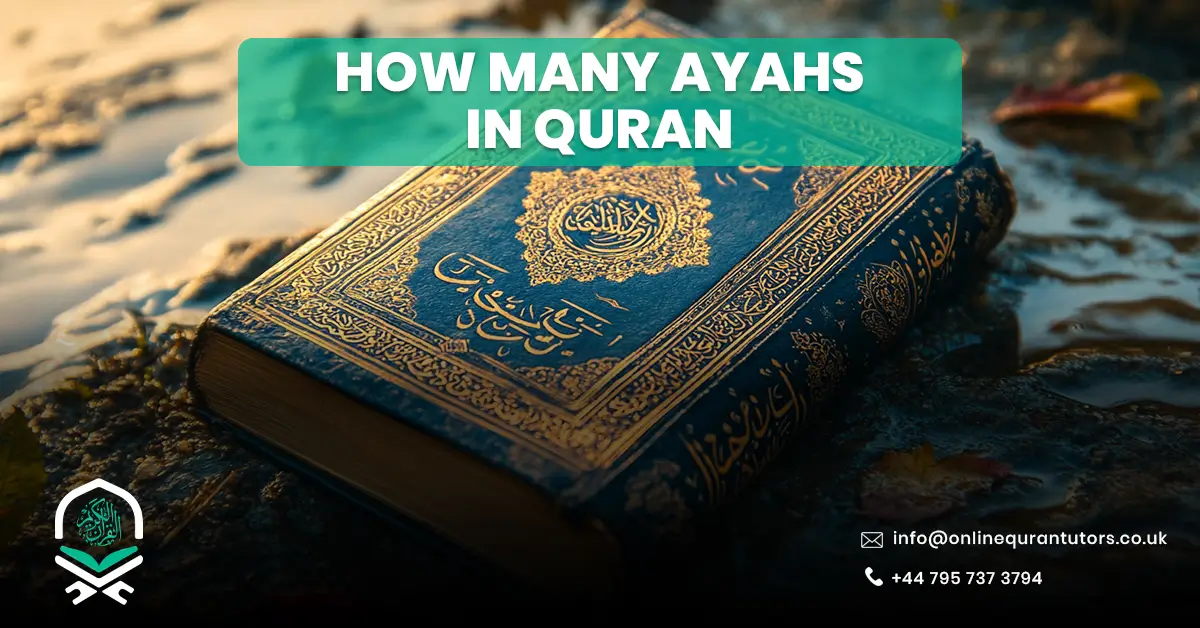Have you ever thought about how many verses, words, and letters are in the Holy Quran? This divine book, revealed by Allah to the last Prophet Muhammad (PBUH), continues to provide guidance and light to humanity.
If you’re wondering how many Ayahs are in the Quran, which Surah is the longest, what the best Ayah is, or which one is the shortest, keep reading for detailed answers and interesting facts!
What Does Ayat Mean in Islam?
In Islam, the term “Ayat” refers to the verses found in the Quran, which is the holy book of Islam. The word “Ayat” in Arabic means “sign” or “miracle,” symbolizing the divine message and guidance from Allah. Each Ayah is considered a sign of Allah’s wisdom, meant to guide Muslims in all aspects of life.
The Quran consists of 114 chapters, known as Surahs, and each Surah is made up of several Ayahs. These verses cover a wide array of subjects, including faith, morality, laws, personal conduct, and spiritual reflection.
Muslims around the world recite and memorize these verses, using them to strengthen their faith, reflect on their actions, and connect with Allah’s guidance in their daily lives.
How Many Ayahs Are in the Quran?
The Holy Quran is composed of 114 Surahs (chapters), each varying in the number of verses (Ayahs) it contains. When discussing the total number of verses in the Quran, it is widely accepted that there are 6,236 Ayahs. However, if we include the phrase “Bismillah” (بسم الله الرحمن الرحيم), which appears at the beginning of each Surah except Surah At-Tawbah (Chapter 9), the total count increases to 6,349 Ayahs. This distinction emphasizes the importance of “Bismillah” and its unique role in the structure of the Quran.
Here is a breakdown of the number of Ayahs in each Surah:
| No | Surah Name | Number of Ayahs |
| 1 | Al-Fatihah | 7 |
| 2 | Al-Baqarah | 286 |
| 3 | Al-Imran | 200 |
| 4 | An-Nisa | 176 |
| 5 | Al-Ma’idah | 120 |
| 6 | Al-An’am | 165 |
| 7 | Al-A’raf | 206 |
| 8 | Al-Anfal | 75 |
| 9 | At-Tawbah | 129 |
| 10 | Yunus | 109 |
| 11 | Hud | 123 |
| 12 | Yusuf | 111 |
| 13 | Ar-Ra’d | 43 |
| 14 | Ibrahim | 52 |
| 15 | Al-Hijr | 99 |
| 16 | An-Nahl | 128 |
| 17 | Al-Isra | 111 |
| 18 | Al-Kahf | 110 |
| 19 | Maryam | 98 |
| 20 | Ta-Ha | 135 |
| 21 | Al-Anbiya | 112 |
| 22 | Al-Hajj | 78 |
| 23 | Al-Mu’minun | 118 |
| 24 | An-Nur | 64 |
| 25 | Al-Furqan | 77 |
| 26 | Ash-Shu’ara | 227 |
| 27 | An-Naml | 93 |
| 28 | Al-Qasas | 88 |
| 29 | Al-Ankabut | 69 |
| 30 | Al-Rum | 60 |
| 31 | Luqman | 34 |
| 32 | As-Sajdah | 30 |
| 33 | Al-Ahzab | 73 |
| 34 | Saba | 54 |
| 35 | Fatir | 45 |
| 36 | Ya-Sin | 83 |
| 37 | As-Saffat | 182 |
| 38 | Sad | 88 |
| 39 | Az-Zumar | 75 |
| 40 | Ghafir | 85 |
| 41 | Fussilat | 54 |
| 42 | Ash-Shura | 53 |
| 43 | Az-Zukhruf | 89 |
| 44 | Ad-Dukhan | 59 |
| 45 | Al-Jathiyah | 37 |
| 46 | Al-Ahqaf | 35 |
| 47 | Muhammad | 38 |
| 48 | Al-Fath | 29 |
| 49 | Al-Hujurat | 18 |
| 50 | Qaf | 45 |
| 51 | Adh-Dhariyat | 60 |
| 52 | At-Tur | 49 |
| 53 | An-Najm | 62 |
| 54 | Al-Qamar | 55 |
| 55 | Ar-Rahman | 78 |
| 56 | Al-Waqi’ah | 96 |
| 57 | Al-Hadid | 29 |
| 58 | Al-Mujadila | 22 |
| 59 | Al-Hashr | 24 |
| 60 | Al-Mumtahanah | 13 |
| 61 | As-Saff | 14 |
| 62 | Al-Jumu’ah | 11 |
| 63 | Al-Munafiqun | 11 |
| 64 | At-Taghabun | 18 |
| 65 | Al-Talaq | 12 |
| 66 | At-Tahrim | 12 |
| 67 | Al-Mulk | 30 |
| 68 | Al-Qalam | 52 |
| 69 | Al-Haqqah | 52 |
| 70 | Al-Ma’arij | 44 |
| 71 | Nuh | 28 |
| 72 | Al-Jinn | 28 |
| 73 | Al-Muzzammil | 20 |
| 74 | Al-Muddaththir | 56 |
| 75 | Al-Qiyamah | 40 |
| 76 | Al-Insan | 31 |
| 77 | Al-Mursalat | 50 |
| 78 | An-Naba | 40 |
| 79 | An-Nazi’at | 46 |
| 80 | Abasa | 42 |
| 81 | At-Takwir | 29 |
| 82 | Al-Infitar | 19 |
| 83 | Al-Mutaffifin | 36 |
| 84 | Al-Inshiqaq | 25 |
| 85 | Al-Buruj | 22 |
| 86 | At-Tariq | 17 |
| 87 | Al-A’la | 19 |
| 88 | Al-Ghashiyah | 26 |
| 89 | Al-Fajr | 30 |
| 90 | Al-Balad | 20 |
| 91 | Ash-Shams | 15 |
| 92 | Al-Lail | 21 |
| 93 | Ad-Duha | 11 |
| 94 | Al-Inshirah | 8 |
| 95 | At-Tin | 8 |
| 96 | Al-Alaq | 19 |
| 97 | Al-Qadr | 5 |
| 98 | Al-Bayyinah | 8 |
| 99 | Az-Zalzalah | 8 |
| 100 | Al-Adiyat | 11 |
| 101 | Al-Qari’ah | 11 |
| 102 | Al-Takathur | 8 |
| 103 | Al-Asr | 3 |
| 104 | Al-Humazah | 9 |
| 105 | Al-Fil | 5 |
| 106 | Quraish | 4 |
| 107 | Al-Ma’un | 7 |
| 108 | Al-Kawthar | 3 |
| 109 | Al-Kafirun | 6 |
| 110 | An-Nasr | 3 |
| 111 | Al-Masad | 5 |
| 112 | Al-Ikhlas | 4 |
| 113 | Al-Falaq | 5 |
| 114 | An-Nas | 6 |
Total Number of Ayahs: 6,236
Notes:
- The “Bismillah” (بسم الله الرحمن الرحيم) phrase appears at the start of each Surah except for Surah At-Tawbah. It is also repeated once in Surah An-Naml. If counted as separate Ayahs, it brings the total to 6,349
Also Read: How Many Surahs Are in the Holy Quran: A Comprehensive Guide
Importance of Ayah in a Muslim’s life
The Ayat (verses) of the Quran hold immense spiritual and moral significance, deeply influencing a Muslim’s life in numerous ways. They provide a comprehensive guide to living in harmony with the teachings of Islam, shaping both personal and social conduct. Here’s how the Ayat impact a Muslim’s daily life:
Guidance for Life: The Quran’s Ayat serve as a roadmap for Muslims, offering guidance on how to live a righteous and fulfilling life. They cover all aspects of life, including ethics, family relationships, community responsibilities, and interactions with others, helping Muslims follow the principles of Islam in every action and decision.
Strengthening Faith: Reciting and reflecting upon the Ayat strengthens a Muslim’s spiritual connection with Allah. Each verse serves as a reminder of His presence, mercy, and power, helping believers maintain their faith and trust in Him.
Comfort and Assurance: During times of hardship and distress, certain Ayat provide solace and reassurance. They remind Muslims of Allah’s infinite wisdom and ability to protect and support His servants, offering hope and peace of mind in challenging times.
Moral and Legal Guidance: The Quranic verses lay down moral principles and laws that organize and govern the life of a Muslim. These guidelines are meant to shape behavior, foster compassion, promote justice, and ensure that Muslims live according to Allah’s will.
Reflection on Creation: Many Ayat encourage Muslims to reflect on the universe and the signs of God’s creation. These verses invite believers to observe the natural world, ponder its complexity, and recognize it as a sign of Allah’s greatness and creative power.
Spiritual Rewards: Reciting the Quran is considered one of the highest acts of worship. The Prophet Muhammad (PBUH) emphasized that those who recite the Quran will be raised among the angels, and those who find it challenging to recite it will receive double the reward for their efforts. The Quran brings not only spiritual benefit but also divine blessings, elevating the reciter in the eyes of Allah.
In every aspect, the Ayat of the Quran serve as a source of guidance, comfort, and spiritual elevation for Muslims, nurturing their connection with Allah and encouraging them to live a life rooted in faith and good deeds.

What Is The Best Ayah In The Quran?
One of the most revered and powerful verses in the Quran is Ayat al-Kursi, found in Surah Al-Baqarah (2:255). This verse is considered by many to be the most significant due to its deep reflection on Allah’s sovereignty, knowledge, and supreme authority over the entire universe.
Ayat al-Kursi emphasizes Allah’s infinite power and control, stating that He is the eternal, all-knowing, and all-present Creator. The verse serves as a reminder of the greatness of Allah, highlighting His unchallenged rule over everything in existence. Its recitation is commonly believed to bring protection from harm, grant blessings, and offer comfort during times of distress.
Muslims recite Ayat al-Kursi for spiritual safeguarding, especially before sleep or when seeking protection from negative influences. This verse embodies the essence of faith in the oneness of Allah and is considered a source of immense spiritual strength. Its significance in Islamic tradition makes it a cherished verse for believers, who often turn to it for both protection and affirmation of their belief in Allah’s majesty.
FAQs
What is the Shortest Ayah in the Quran?
The shortest Ayah in the Quran is found in Surah Al-Kawthar (108:3), which consists of just three words: “Inna atainaka kawthar” (Indeed, We have granted you Kawthar). This verse, though brief, holds significant meaning, highlighting the blessings of Allah.
Which Ayah is Known for Protection and Blessings?
Ayat al-Kursi (Surah Al-Baqarah, 2:255) is widely regarded as one of the most powerful Ayahs in the Quran. It is frequently recited by Muslims for protection from harm, seeking Allah’s blessings, and affirming His sovereignty over all creation.
Which Surah Has the Most Ayahs?
The Surah with the most Ayahs is Surah Al-Baqarah, the second chapter of the Quran, which contains 286 verses. It is a comprehensive Surah covering a wide range of topics including guidance for personal conduct, laws, and stories of previous prophets.
Join Online Quran Tutor UK – Start Your Free Trial Today!
At Online Quran Tutor UK, we’ve designed our Quran with Tajweed Online Course to make learning Tajweed and Quranic rules easier and more effective for online learners of all ages. Our experienced teachers simplify complex Tajweed rules through engaging examples, interactive activities, and easy-to-follow video lessons.
Whether you’re just starting or looking to improve your recitation, we’re here to support you every step of the way.
Courses We Offer:
- Noorani Qaida Course – Learn the fundamentals of Arabic and Quranic pronunciation.
- Online Tajweed Course for Kids – Specially designed for children to learn Tajweed in a fun and interactive way.
- Quran Reading Course – Build fluency and confidence in reading the Quran correctly.
We also offer:
Contact us now to book your free trial class and begin your spiritual journey with expert guidance and flexible learning options!
Conclusion
The Ayahs in the Quran are not just verses; they are divine signs that guide, comfort, and protect Muslims in every aspect of their lives. From the powerful Ayat al-Kursi, which affirms Allah’s sovereignty, to the shortest Ayah in Surah Al-Kawthar, each verse carries deep meaning and spiritual significance.
The Quran, with its 6,236 verses, offers comprehensive guidance on faith, morality, law, and personal conduct, shaping the lives of millions of Muslims around the world. Understanding and reflecting on these Ayahs helps strengthen a Muslim’s connection to Allah, offering clarity, peace, and spiritual growth.
Whether reciting these verses for protection, reflection, or personal growth, the Quran’s Ayahs continue to play a pivotal role in the lives of believers, leading them on a path of righteousness and faith.
Join the Noorani Qaida Course at Online Quran Tutor and begin your journey to accurate Quran reading with expert guidance—anytime, anywhere!





